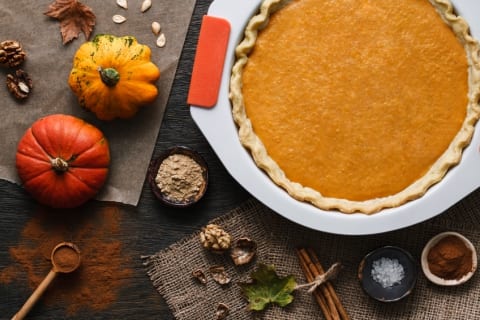Medicine or Malarkey: Is Pumpkin Pie Good for Your Health?
November 4, 2016

Fall foliage and cooling weather used to announce the arrival of autumn. That duty has now shifted to the Pumpkin Spice Latte. When Starbucks starts advertising PSL, you know fall is right around the corner!
But Starbucks isn’t alone in using this iconic fall squash plant to ring in a new season. Everywhere you turn these days, from beer to bread and, of course pie, pumpkin is the guest of honor. With all this pumpkin available, you have to start to wonder: is it really all that good for you?
There’s no doubting the pumpkin’s versatility as a cooking ingredient; but it appears it might be equally as versatile when it comes to your health.
Pumpkins and your heart
High blood pressure can have a negative impact on the health of your heart. Often times, doctors will recommend patients reduce their sodium intake to treat hypertension. This can include consuming adequate potassium in which pumpkin happens to be rich. Potassium helps to lower blood pressure by balancing out the negative effects of salt. Your kidneys then help to control your blood pressure by controlling the amount of fluid stored in your body.
Pumpkin seeds are also naturally rich in phytosterols (a plant-based chemical) which studies have shown reduces LDL (or bad) cholesterol.
Rich in beta-carotene:
Decrease cancer risk, protect eye health and get better skin
The orange coloring of pumpkins complements the look of fall perfectly, but that’s not all it does. The orange hue of pumpkins (and carrots, butternut squash, and sweet potatoes) signifies that these plants boast a fair amount of antioxidant beta-carotene. According to the National Cancer Institute, beta-carotene may play a significant role in cancer prevention.
Beta-carotene has also been shown to support eye health and prevent degenerative damage. Our bodies convert beta-carotene into vitamin A, which is essential for eye health and helps the retina absorb and process light.
With one cup containing more than 200% of the recommended daily intake of vitamin A, pumpkins make an excellent dietary choice to protect your eyes.
The ever-versatile beta-carotene also protects your skin from wrinkle-causing UV rays; but pumpkin pulp makes for quite the effective exfoliating face mask as well! All you need is ¼ cup of pureed pumpkin (not pie), an egg, a tablespoon of honey, and a tablespoon of milk. Mix, then apply, and wait 20 minutes before washing it off with warm water.
Give your immunity the boost it needs
There is still debate on whether vitamin C can help ward off colds, but with nearly 20% of the recommended daily amount in one cup, it doesn’t hurt to turn to pumpkin when you have the sniffles.
Also, the massive amount of vitamin A in one serving will help your body fight infections, viruses, and infectious diseases.
Yes, but is pumpkin pie good for your health?
With so many health benefits associated with pumpkin, it’s easy to assume that pumpkin pie is the best of both worlds: a treat you actually like to eat that also does your body good.
However, the truth is a bit more complicated than that.
The average pumpkin pie recipe will include some not-so-healthy ingredients as well, including:
- Shortening
- Flour
- Brown sugar
- Salt
Not to mention many folks used canned pumpkin pie mix, which has added sugars and syrups.
The health benefits of pumpkin won’t necessarily be negated by these additional ingredients. But if you’re looking to maintain a healthy lifestyle this winter, you should eat pumpkin pie in moderation (and always used canned pumpkin, not pie mix).
Remember, there’s no shortage of ways you can add pumpkin – and its seeds – into your diet to capitalize on its flurry of health benefits.
